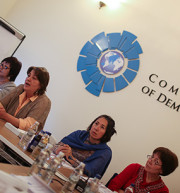
This page summarizes cases raised with Poland by the Special Rapporteur between May 1, 2011, (when the Special Rapporteur took up his functions) and February 28, 2017 (the date of the last public release of communications). Communications are released to the public once per year. This page also contains observations on these communications and on responses received from Poland. Communications and observations are divided into sections based upon which observation report they originally appeared. Each communication is referenced as urgent appeal (UA), allegation letter (AL), joint urgent appeal (JUA) and joint allegation letter (JAL) - the hyperlinks lead to these documents. This is followed by the date the communication was issued, as well as the case number and the State reply (also hyperlinked if available). Summaries and communications are published only in the language of submission (in the case of Poland, English). First Report (May 1, 2011 to March 15, 2012) None Second Report (March 16, 2012 to February 28, 2013) Other letter, 23/07/2012. Case no. POL 1/2012. State Reply: None to date. Allegation of legislative amendments that may unduly limit the right of peaceful assembly. Observations The Special Rapporteur regrets the Government of Poland did not reply to the communication he... Continue reading →

(WARSAW, Poland) – Political will is a major obstacle in ensuring civil society’s access to resources in many OSCE countries, according to participants in a May 7 regional dialogue organized in Warsaw by the Community of Democracies and the team of UN Special Rapporteur Maina Kiai. “It’s not a question of convincing through enough human rights laws or standards,” said one participant. Sometimes “they can’t be convinced.” The dialogue was the first event in a new two-year project focused on enhancing space for civil society and strengthening the right to access financial resources. The project was launched in February, and is being funded by the Swedish Ministry of Foreign Affairs. The May 7 Warsaw event looked at international human rights norms, standards and mechanisms to promote the right to freedom of association – and possible ways to strengthen these tools. More than 20 members of civil society from throughout the OSCE region participated. The focus on political will was central to the discussions, with one participant saying that talking about human rights norms to the government in his country was like “talking to the wall.” As a result, the road to ensuring civil society’s access to resources will require creative schemes and new ways of thinking, participants said –... Continue reading →